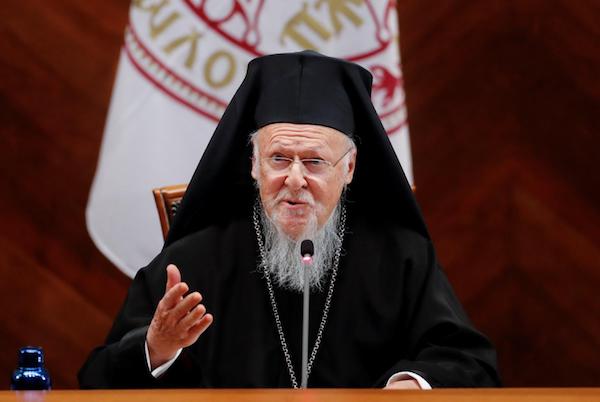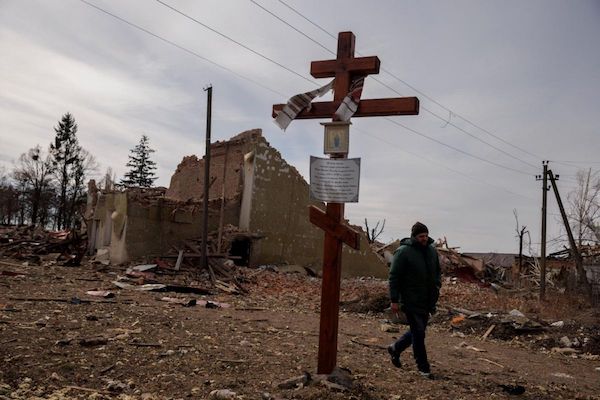The Vatican’s secretary of state has warned that an escalation of the war in Ukraine would threaten “the destruction of all humanity”.
Speaking on Wednesday during a visit to Zagreb marking thirty years of diplomatic relations between Croatia and the Holy See, Cardinal Pietro Parolin reiterated the Pope’s willingness to mediate between the combatants although “at the moment there is little hope that a consensual conclusion to the war can be reached”.
Cardinal Parolin met Croatian bishops and delivered the homily at a Mass in the capital, where he cited Blessed Alojzije Stepinac, the Archbishop of Zagreb during the Second World War, as a witness to Christ in the face of darkness:
“In these times of war in Europe it is worth having recourse to his intercession. Today, like him then, we are faced with the evil that is born in the hearts of men and tends to occupy minds and souls.”
Stepinac is a popular figure among Croatian Catholics, and regarded as a martyr to Yugoslavia’s communist regime. After the war he was convicted of collaboration with the fascist Ustaše regime which had ruled Croatia between 1941-5 and imprisoned. His record during the Second World War, his trial and conviction, and his subsequent beatification still polarise opinion.
The Vatican was one of the first states to establish recognise Croatia after it declared independence from Yugoslavia on 25 June 1991. They established formal diplomatic relations in February the next year.
Comparisons have been drawn between conditions in the Balkans after the collapse of Yugoslavia and the present situation in Ukraine, where war has enflamed religious tensions.
Orthodox Christians loyal to the Moscow patriarchate are suspected of Russian sympathies. The Guardian reported this week on accusations of collaboration against a priest of the Moscow-aligned Church in the town of Borodyanka. Another cleric of the independent Ukrainian Orthodox Church claims that Fr Viktor Talko was complicit in the removal of Ukrainian civilians to Belarus when the town was under Russian occupation.
Fr Vitaliy Novak, a Roman Catholic priest and the chair of trustees for Depaul Ukraine, has said that Ukraine must rebuild itself even as fighting continues, and compared conditions with those in the Balkans in the 1990s. He told The Tablet that he was drawing on his experiences in Serbia as he worked on the charity’s relief efforts in Ukraine.
“We are helping people to return to their lives,” he said during a flying visit to London for the “Brave Ukraine” event on 5 May addressed by Volodymyr Zelenskiy via video link and attended by Boris Johnson and Sir Keir Starmer. He described clocking 20,000km in his car as he made aid deliveries around the country.
Fr Novak described the celebration of Orthodox Easter in his home city of Kharkiv, where a Depaul delivery of wheat had allowed citizens to bake their traditional cakes for the feast.
“What can stop us celebrating Easter? It is the most powerful of facts, the victory of life over death,” he said. “We have a great deal of experience of life and death now.”
He described his surprise at the scale of his reception at the “Brave Ukraine”, where Depaul was the only aid organisation represented: “I didn’t expect so much attention, I am thankful. All Ukrainian people are thankful, they cannot believe that people here remember them.”
The Vatican’s foreign minister, Archbishop Paul Gallagher, is due to visit Kyiv next week. Speaking on Italian television on Thursday, he said that the Holy See recognised Ukraine’s right to defend itself but that a negotiated peace remained the priority.
Noting the conflicts religious dimension, he said that the Russian Orthodox Church struggled to differ from the Russian government’s position, but that Pope Francis still desired talks.
“For the Pope, ecumenical dialogue is a priority, even if at the moment the meeting with Patriarch Kirill does not seem opportune, because the right conditions are not in place. But the dialogue will go forward.”



 Loading ...
Loading ...